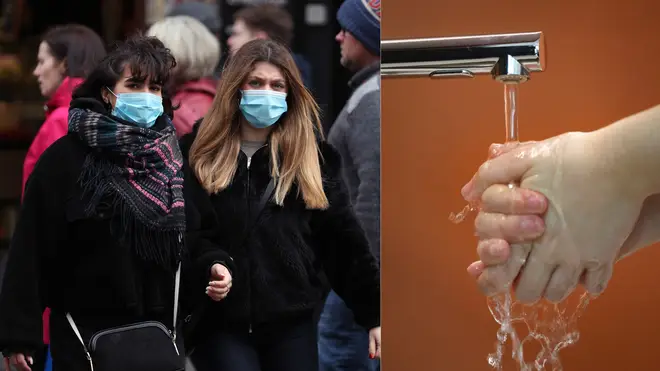
Clive Bull 1am - 4am
9 March 2020, 06:40

What are the symptoms of the Covid-19 coronavirus from Wuhan in China, how does it spread, and what is self-isolation?
Coronaviruses are a large family of viruses that can make humans and animals sick. They cause illnesses that can range from the common cold to more severe diseases.
Coronavirus (COVID-19) was first reported in December 2019 in Wuhan City in China.
Other coronaviruses include Middle East Respiratory Syndrome (MERS) and Severe Acute Respiratory Syndrome (SARS).
Read more: Coronavirus: Beard sanitiser sales spike after NHS urged staff to shave
The UK Chief Medical Officers have raised the risk to the public from moderate to high.
Health professionals are working to contact anyone who has been in close contact with people who have coronavirus.
The government published its coronavirus action plan on 3 March.
On 10 February, the Secretary of State for Health and Social Care, Matt Hancock, announced strengthened legal powers to protect public health.
The Health Protection (Coronavirus) Regulations 2020 have been put in place to reduce the risk of further human-to-human transmission in this country by keeping individuals in isolation where public health professionals believe there is a reasonable risk an individual may have the virus.
Symptoms
Symptoms can range from mild illness to pneumonia. Some people will recover easily, and others may get very sick very quickly. People with coronavirus may experience:
-Fever
-Flu-like symptoms such as coughing, sore throat and fatigue
-Shortness of breath
But these symptoms do not necessarily mean you have the illness.
The symptoms are similar to other illnesses that are much more common, such as cold and flu.
Read more: Coronavirus UK: Do surgical face masks work to avoid virus symptoms?
The official NHS advise says to stay indoors and avoid contact with other people if you’ve travelled to the UK from the following places in the last 14 days, even if you do not have symptoms:
Iran
Hubei province in China
Lockdown areas in northern Italy
Special care zones in South Korea
Read more: Coronavirus: What is a pandemic and how is one declared?
Stay indoors and avoid contact with other people if you’ve travelled to the UK from the following places in the last 14 days and have a cough, high temperature or shortness of breath, even if your symptoms are mild:
Mainland China outside of Hubei province
Italy outside of the lockdown areas
South Korea outside of the special care zones
Cambodia
Hong Kong
Japan
Laos
Macau
Malaysia
Myanmar
Singapore
Taiwan
Thailand
Vietnam
There is evidence that the virus spreads from person-to-person contact.
The virus is most likely spread through:
-Close contact with an infectious person
-Contact with droplets from an infected person’s cough or sneeze
-Touching objects or surfaces (like doorknobs or tables) that have cough or sneeze droplets from an infected person, and then touching your mouth or face
Read more: Brighton shop owner asks customers to wear masks and gloves amid coronavirus fear
Surgical masks in the community are only helpful in preventing people who have coronavirus disease from spreading it to others. If you are well, you do not need to wear a surgical mask as there is little evidence supporting the widespread use of surgical masks in healthy people to prevent transmission in public.
Everyone should practise good hygiene to protect against infections. Good hygiene includes:
-Washing your hands often with soap and water
-Using a tissue and cover your mouth when you cough or sneeze
-Avoiding close contact with others, such as touching
Read more: Prime Minister to hold Cobra meeting in wake of third death
There is no treatment for coronavirus, but medical care can treat most of the symptoms. Antibiotics do not work on viruses.
If you have been diagnosed with coronavirus, isolate yourself in your home.
Do not go to public places, such as work, school, shopping centres, childcare or university. If possible, ask other people to get food and other necessities for you and leave them at your front door.
Only people who usually live with you should be in your home. Do not let in visitors.
You do not need to wear a mask in your home.
If you need to leave home to seek medical attention, wear a surgical mask (if you have one) to protect others.